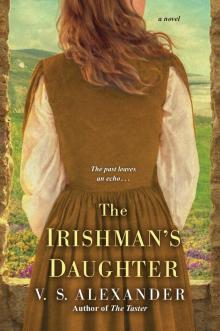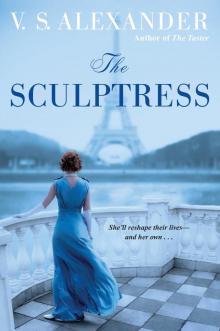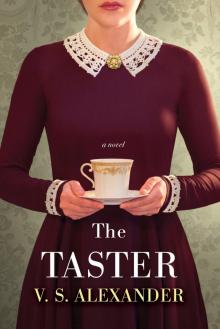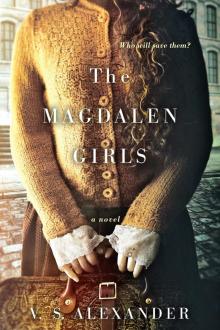- Home
- V. S. Alexander
The Irishman's Daughter Page 33
The Irishman's Daughter Read online
Page 33
“As soon as the heavens make our way clear.” Connor pointed to the sky. The clouds parted, revealing a lacy fabric of stars. “It’s beautiful, isn’t it? A perfect night to plunder.” Connor laughed and then faced Rory. “How is Briana? I heard she and Lucinda traveled to America. I hoped they might make the ship.”
The euphoria induced by the poteen shifted to melancholy with Connor’s question. A sudden vulnerability washed over him, unmasking the thin veil covering his heart. “Thank you for letting us know, but I’ve heard nothing yet. I’m confident the Warton docked in Boston, because I’m sure any bad news would have traveled to Ireland by now. Beyond that, I don’t know. I’ll be lucky to receive a letter by the spring. I hope Brian and I last that long. How did you know she had left?” He found his fists clenched by his sides.
“Hardly anything escapes the notice of a mad poet,” Connor said, referring to Daniel Quinn. “He ran into a couple of Mollies in Westport in one of his drunken fits and spilled his guts—literally. As they lifted him off the ground, he was muttering about our devilish landlord, Brian and his daughters escaping to America. Word travels fast.”
“More than Quinn’s mouth is a problem,” Rory said, recalling the information he had given to the constable about the shooting at Lear House. “I think he may have been the one who shot Blakely. The poet’s nowhere around here, is he?”
Connor snickered. “Quinn? Shoot Blakely? Maybe he’s not as crazy as I thought. I may have to shake the poor bastard’s hand.” He turned the flask upside down, and nothing came out but a few silvery drops. “Quinn would be around if he knew there was something to drink. Most likely he’s holed up at The Black Ram or the public house in Castlebar. He doesn’t have the mental resources or the money to take his leave from a pub.”
They talked about Connor’s wife and children, who were safe with relatives in Bangor, although the family was struggling as well. Connor had agreed to go on this mission to get food for them. A low whistle carried on the wind, a signal that it was time to leave.
They returned to the fires and helped the men carry the curraghs from the shore to the bay. Rory took off his shirt and spread mud over his face and chest. Connor checked both their pistols and pronounced them ready for use.
Orange and another man, a farmer from Ballycroy, led the way. “Quiet as we go.” He pointed to a pile of knotted ropes. “When we get to the ship, a few of you spritely lads will have to scale the side or climb the bowsprit rigging to take our visitors by surprise. One man will remain below to help load the cargo.” He looked toward the purple horizon. “It’s a far way out, on the other side of Blackrock, but we can make it. Thank God for calm seas. More than your back will ache tomorrow if providence is on our side.”
The men loaded the rifles and ropes into the canoes and muttered quick prayers. Rory and Connor took their places in a curragh near the middle of the flotilla. Orange raised his hand, and his companion shoved off.
Soon they were pulling hard and following the lead of several canoes cutting through the wind and swells. Neither man talked, but Rory thought, as his arms powered against the waves, that Orange had a strange idea of what constituted calm seas. The trip back, if everything went well, would be much easier. The cold saltwater showered over them as they cut across the bay toward the small island of Duvillaun More. The mountainous form of Achill rose out of the blackness to the south.
Rory was happy that his old nemesis, Connor, still retained much of his strength. His back to the wind, his friend flexed and strained from his place in the front of the canoe. With their synchronized exertions, they soon found themselves near the front of the raiding party. Sweat poured down Rory’s body—his body heat and the layer of mud negated any ill effects from the chilly waters.
A large stretch of deep, choppy water opened before them after passing by Duvillaun More. The tiny spit of Blackrock lay in front of them. Rory looked back to see several of the party languishing behind. Then the clouds closed above them for a time, thrusting the canoes into utter darkness. When the heavens opened again, scattering starlight over them, the ship, dusky in its outline except for the folded white sails, rocked on the waves.
“A mackerel sky and mares’ tails make lofty ships carry low sails,” Connor said. Rory barely heard his words over the wind. The vessel was a lofty wooden ship, a three-master anchored off the western side of Blackrock. A ship showing no light meant the crew had taken to their beds below. No lanterns bobbed on deck, and Rory was happy to see that it was a true smooth-sided merchant vessel devoid of cannons.
The lead canoes held back so the others could catch up. After what seemed a long wait bobbing over whitecaps, the last of the party was in place to raid the ship.
Orange and his companion pulled their canoe next to one containing two young men who, upon his signal, climbed the lines and scurried like galley rats up the bowsprit rigging with the knotted ropes looped around their bodies. Seconds later, the ropes dropped to the waiting raiders.
Connor agreed to man the canoe to keep it from floating away. The pistol tucked into his waistband, Rory climbed fist over fist up the rope until he was able to propel himself over the side to the deck below. Soon fifteen raiders stood onboard the ship looking for any sign of the crew.
Several men brandishing pistols sneaked to the hold doors and, after flinging them open, descended belowdecks. In less than five minutes, a crew of seven and the captain appeared up top in their nightshirts and breeches. They were English, and while they stood tall and proud near the bow, they were no match for the eight firearms pointed their way. That left seven men, Rory included, to unload what they could from the hold.
Orange’s stout companion assumed command of the raiders, instructing the men who scurried through the ship lighting lanterns and taking stock of the goods. A line of men heaved the heavy bags of Indian corn to the deck. They were lowered into the curraghs by the ropes. Several slipped from their harness and splashed into the sea, bringing forth a volley of curses from Orange.
The true bounty, however, came in the form of dried meats, cheeses, wine, firearms, and other luxury goods afforded the English crew. Rory admired a fine silver sword and a bag of other silver pieces that were passed his way before being lowered to a canoe. In less than an hour, the canoes were loaded and ready to depart.
“Stay put for fifteen minutes or we’ll fire upon you,” the stout man told the captain and crew before clambering over the side.
Rory scrambled down the knotted ropes with the others and took his place opposite Connor, the corn resting in the middle of the canoe. The two young men tossed the ropes to Orange and took off for the bowsprit rigging. Rory watched as they swung down from the deck, descending the lines like monkeys. They pushed off from the ship and were soon sailing fast over the waves toward their destination on the eastern side of the bay.
“Get down,” Connor screamed.
Rory ducked. He didn’t see the flash, but he did hear the percussion as a pistol was fired in their direction.
A shriek carried over the waves. The Mollies fired back, and the English crew scattered about the deck. Soon carried by the waves, they were beyond the range of firearms.
The large man bent over Orange, who doubled up in pain. Connor swung the canoe toward them. Their leader had been struck in the left shoulder by a ball. His blood spread in a large black splotch down his jacket.
“Do you need help?” Rory called out to them.
Orange lifted his head and screamed, “No, damn it. Onward!” He grabbed the oar with his right hand and, uttering curses and crying out in pain, rowed as fast as he could.
Soon the canoes were past the island and on their way back to the camp. With the wind at their backs, the waves picked up their canoes and thrust them toward the coastline. They had completed the raid and were now safely in shallow waters, away from the revengeful reach of the English ship.
Orange stumbled from the curragh and collapsed on the beach. Two men held the large man down
while Rory stripped his jacket from him and ripped open the shirt where the ball had blown a hole.
“Connor, get me a lamp and gather my shirt,” Rory ordered. Connor called out for a lantern and ran to get the clothing. He returned with both and knelt next to Rory.
The ball had lodged in Orange’s shoulder. Rory could see its smooth, circular form surrounded by bloody flesh in the yellow light.
“You’re in luck,” he told Orange. “It didn’t even hit the bone. Good thing you’re built like a bull. Steel yourself, this is going to hurt.” Rory dipped his hands in cold saltwater and returned to the man. He dug his fingers around the ball and popped it out with a thunk. The wound bled profusely after a sharp cry from Orange. “Get seaweed for a poultice,” he instructed Connor.
He placed the stringy green leaves over the wound and bunched his shirt across Orange’s shoulder and back before knotting it in the front.
“Thank you, my friend,” Orange said with a grimace. “There’s a place in heaven for you.” Many men offered poteen. Orange lifted himself from the sand with his right arm and hobbled toward a smoldering campfire. Rory and the others followed.
“Sleep well tonight, my fellows.” Orange collapsed on the heath. “Tomorrow we have the hard work of securing our food. We’ll work out the distribution plans on the new day. Keep the fires low so we don’t give away our position to the English.” He instructed two men to keep watch for the night and then patted Rory on the back and turned him aside. “I’ll make some special arrangements for you,” he whispered.
Rory waded a few yards out in the chilly bay and washed the mud off his face and chest. Then he and Connor left the others and settled in a hollow away from the beach. The stars blazed overhead in a glorious display of sparkling light, and Rory wondered, as he had many nights, how his wife was faring in Boston. He pictured her in a warm, comfortable room, eating fine food and laughing with ladies from high society. She was attired in a beautiful blue dress, her neck adorned with a pearl choker and her finger showing a glittering diamond ring. He wanted the best for her, now and always. The dream burst when he woke up shivering. He was without a shirt sleeping next to Connor on the cold ground.
He found a lookout and was able to secure an old gray blanket to wrap around him. This time when he closed his eyes he found his thoughts had changed. Now he saw Brian, his mouth drawn and cheeks sunken, crying out for food. He brushed a tear from his eye because he knew that dream was much more real than what he had envisioned for Briana.
* * *
Briana started her job as a bookkeeping assistant at Peters Building Trades several days after Lucinda began working for the Carlisles. The office was on Charles Street at the south end of Beacon Hill, not far from the boarding house. As fall deepened, Briana was happy that she hadn’t far to walk on cold and rainy days.
The pay was half what Mr. Esperanza had offered as a “purveyor of fine goods,” but the job required little physical effort other than filing papers, making ledger notations, and conversing with Irish workers who had questions about their jobs or wages.
The owner was a tall, lean man who, despite his strict fourth-generation Boston heritage, was a Quaker with a good heart and an equal love of humanity. He told Briana he was happy to help the Irish in any way he could, even involving himself in relief efforts in Ireland and working with the Irish Immigration Society in Boston. Mr. Peters had made her feel at home from her first day on the job and, after noticing her wedding ring and her pregnancy, made sure her chair and desk were comfortable. She couldn’t have been happier when collecting her weekly pay.
Lucinda was less enamored of her job, although it paid more. It did not include, as she had hoped, accommodations for them both. She often complained about the “poor wages” and “backbreaking work” she had to perform. Briana refrained from reminding her sister about the housework she had done almost single-handedly most of her life. Lucinda had never had to work hard at serving or cleaning in Ireland with Briana in control.
Despite their new positions, they still found themselves on the fringes of Boston society, branded as immigrants who had little to offer. “Isn’t it wonderful, what the Carlisles do for the poor,” a snobbish lady had told Lucinda as she handed off her wet coat. As her sister described it, had she acted upon her anger that day she would have lost her job.
One evening in late October, a chilly rain swept in from the north. Mr. Peters had offered to escort Briana home to the Newton on Beacon in the dismal weather. Briana happily accepted his offer, and the two set off toward the boarding house as night fell. Mr. Peters’s umbrella buckled in the rain. He tossed it aside and grabbed her by the waist to make sure she didn’t slip in any of the fast-developing puddles.
She skirted the water and slick cobblestones, keeping her eyes down as she walked. A crowd had gathered near the boarding house door, and Mr. Peters brought her attention to it. A woman lay sprawled on the walk, her legs splayed into the street. Several men and ladies bent over her.
Briana’s heart raced in a sudden burst of panic. What if it was Lucinda? But as she drew closer, she saw the woman wore a dress of plain gray fabric. Mr. Peters quickened his step, and soon they had joined the others.
She peered down at the mangled face, the swollen and bruised eyes, the split lips that gushed blood down her chin. The woman looked at her and gurgled in a raspy voice. “I made it. . . . I’ve come to see you.”
“Addy!” Briana knelt beside her and lifted the woman’s head from the sidewalk. Addy screamed in pain from the raw and bleeding slit across her neck.
“Take care of my Quinlin,” she managed to gurgle as crimson bubbles formed over her mouth. Then her eyes closed.
“Keep her still,” Mr. Peters said, and straightened his tall frame. “I’m going for a doctor.”
Briana nodded and ran her hands through Addy’s wet hair. “Hold on. Help is on the way.” She lifted the woman’s hand, which was sliced across the knuckles. “Who did this?” Addy didn’t answer. “Tell me who did this?” She grasped the bloody fingers.
A woman from the boarding house whispered, “Let her pass, miss. She’s done for, and agitating her soul won’t help.”
She didn’t care what the others thought. They didn’t know Addy; they didn’t know how hard the woman’s life had been since she had left Ireland.
Addy motioned for Briana to bend close to her face. “You saw him. . . . He’ll kill my Quinlin.”
The woman gasped, death rattled across her chest, and her head fell limp in Briana’s arms. The rain pattered on Addy’s face, washing the woman’s blood onto Briana’s hands. She lowered her to the brick and swiped at her blood-stained fingers. Seldom had thoughts of revenge entered her mind, but had she carried a pistol she would have shot the man whom she believed killed her friend—one of the Carson brothers.
The crowd dispersed, and Addy lay on the sidewalk, the rain pooling on her flimsy dress. Mr. Peters arrived a few minutes later accompanied by a police officer and a doctor, who, after a quick examination, pronounced Addy dead.
Briana reached out for Mr. Peters’s hand, too shaken to stand on her own.
“Did she tell you anything?” the officer asked.
“Yes,” Briana replied, her mind whirling. “She wants me to take care of her child.”
The agitated policeman sighed. “I mean, about the murderer.”
She wanted Quinlin away from the house in case one of the brothers tried to get to him. “One of the Carson brothers—I don’t know their names. Her boy, Quinlin, lives near Christ Church. Can you protect him?”
“Is he Irish?” the officer asked with a disdainful tone and shifted on his feet. “We don’t have the time to go chasing after Paddy, and if I know the neighborhood, the bog burners will protect him to within an inch of their lives.”
Briana wanted to slap the policeman; she was getting nowhere. A sudden exhaustion swept over her.
“We’ll go first thing in the morning,” Mr. Peters said. “I’ll
send a man tonight to keep watch.”
The officer took Briana’s name and address and then turned his attention to the body. “Her throat’s been cut,” he said to the other officers who arrived in a horse-drawn police wagon.
She wiped her hands on her blood-stained dress and gave Mr. Peters the directions to Addy’s house as best she could, for she had no street number.
Mr. Peters shook his head. “Come to the office tomorrow morning when you can. Now go inside before you catch your death.”
She thanked him and shuffled inside after a last look at Addy. A crowd of women stood near the front desk giving her looks of horror mixed with disbelief. She slowly climbed the steps to her room, stripped off her dress, and washed herself in a chilly bath.
Briana sat shivering under two blankets when Lucinda arrived about eight. Her sister had seen the leftover blood stains on the walk and rushed to her side.
“Are you all right?” Lucinda asked. “What happened? I heard a woman died.”
She collapsed in tears as she told her sister the story. Quinlin, she hoped, would be rescued in the morning after one last night in that terrible house.
CHAPTER 19
“How on earth do you suppose we will support this child?” her sister snapped at breakfast the next morning.
“I heard the same words when we helped Father O’Kirwin feed the poor,” Briana replied. “Remember the boy I saw die at Lear House? His face haunts me to this day. I’m not letting that happen again.”
“Yes, but how many others did we save?” Lucinda said with raised voice as she buttered her toast. “How many of those unfortunate people lived? We have enough worry with Father and your husband.”
The other ladies in the dining room threw disparaging looks their way.
Briana slammed her hand on the table. “If we saved one life for one day, I’d say we’d done our Christian duty.”
Lucinda rolled her eyes. “I had hoped that your flames of charity would be extinguished after all we’ve been through.” She tossed the toast on her eggs and looked at the food with disgust. “You’ve ruined my appetite and I have to be at work in a half hour. You only have yourself to blame for ruining my day.” She got up from her chair and pointed a finger at Briana. “And I forbid you to go to that house and bring home a child. He can’t stay here. Think of your baby—and us! Don’t be a fool!” She took a sip of tea and swept up the stairs, leaving Briana alone at the table.

 The Irishman's Daughter
The Irishman's Daughter The Sculptress
The Sculptress The Taster
The Taster Her Hidden Life
Her Hidden Life The Magdalen Girls
The Magdalen Girls